(ENG/ESP) Botanic Garden of Sucúa (Ecuador) / Parque Botánico de Sucúa (Ecuador)
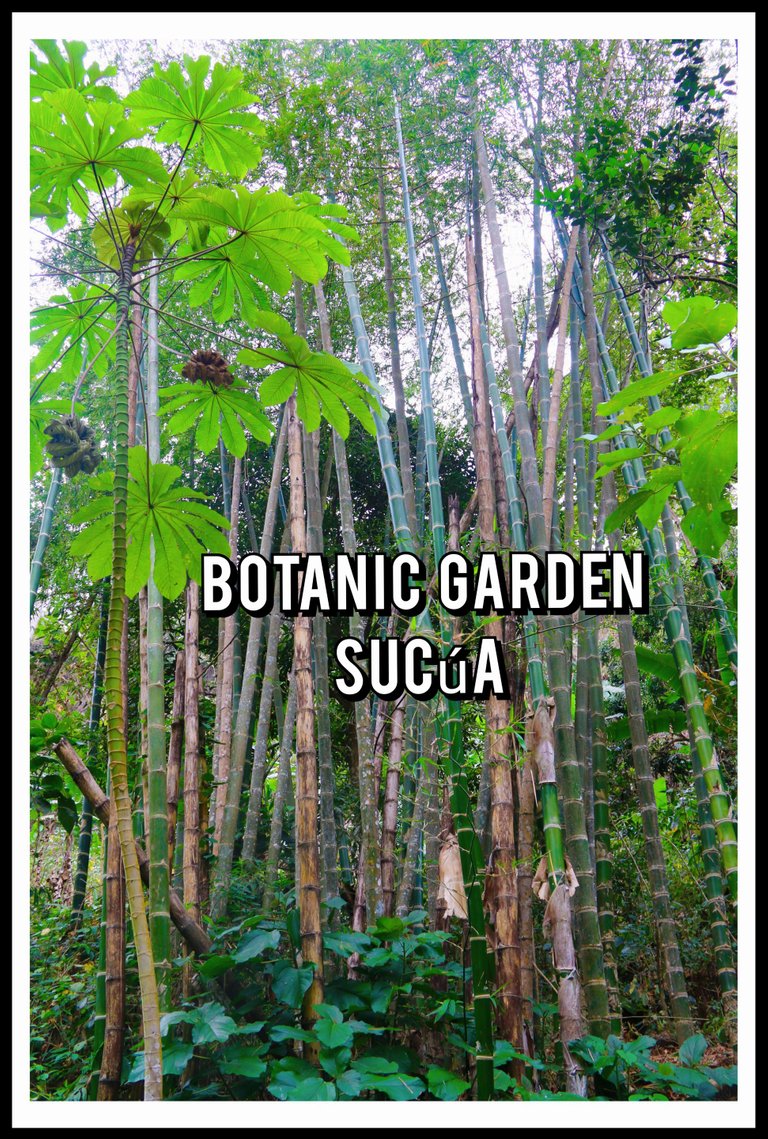
Hello world of Hive! Today I want the share with you my exciting visit at the Botanical Garden of Sucúa, Ecuador.
Sucúa Botanic Garden
The Botanic Garden of Sucúa Canton is a regional park that occupies 27.82 hectares of the land of Ecuador. Its main aim is to preserve the local flora and to provide information on the numerous plant species that are found in the area of conservation. The climate that dominates the site is humid subtropical, one of the most favourable climates for biodiversity. In other words, this forest thrives in life! both vegetative and faunal. Through this majestic forest there is a 1200m-long trail for visitors, so that they can experience what the subtropical forest has to offer.
Guess what; I took the offer!
And so I start walking on this man-made path crossing a pristine patch of forest.
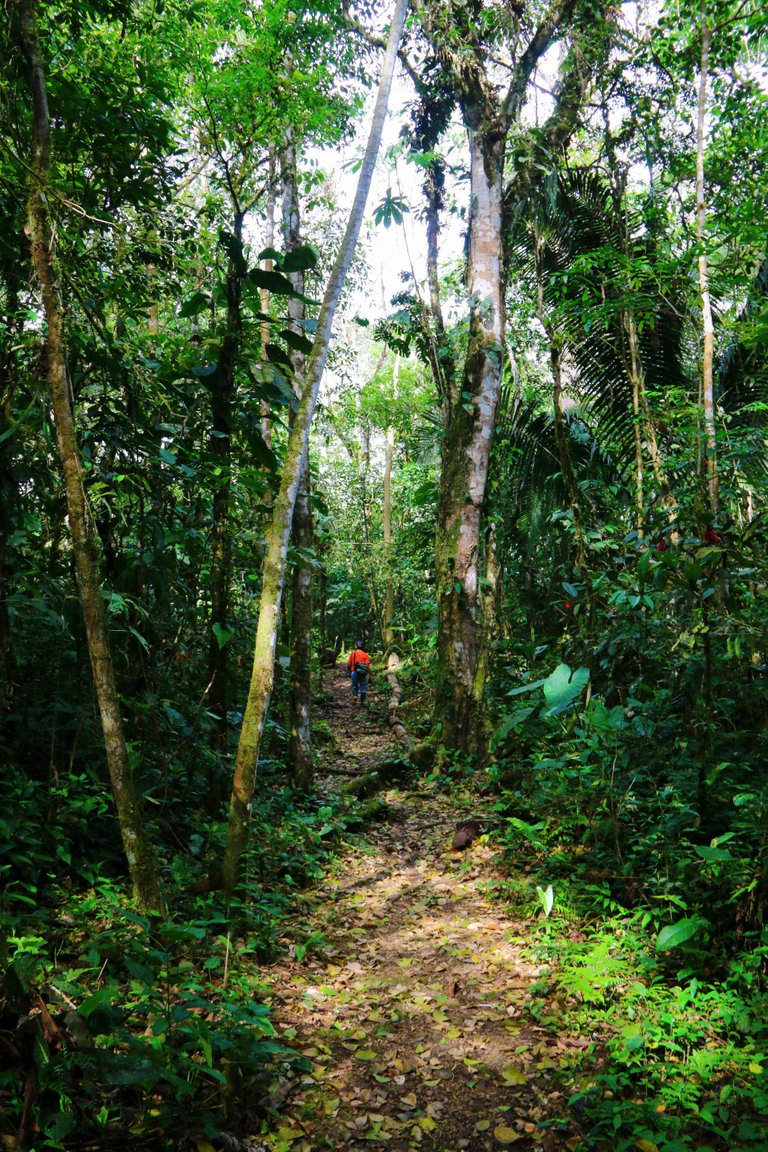
Trees and greeeens
There's a bunch of things that I love about the rainforest. One of them being that size of trees. The magnitude is simply compelling to me. It give rise to great awe within me and it makes me feel somewhat small, not in a derogatory way but rather in a soothing manner; Nature is a protective and invincible mother.
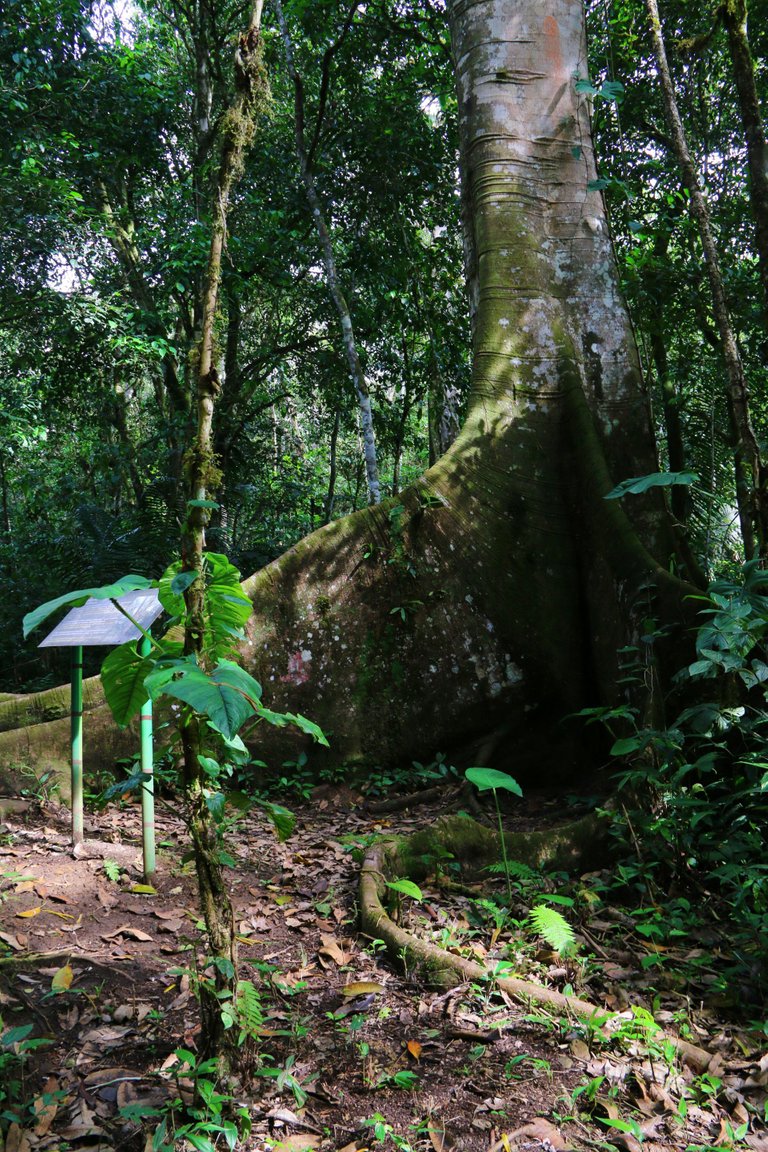
Another thing that fascinates me about tropical forests is the GREENNESS! My eyes bathe in this lush green paradise.
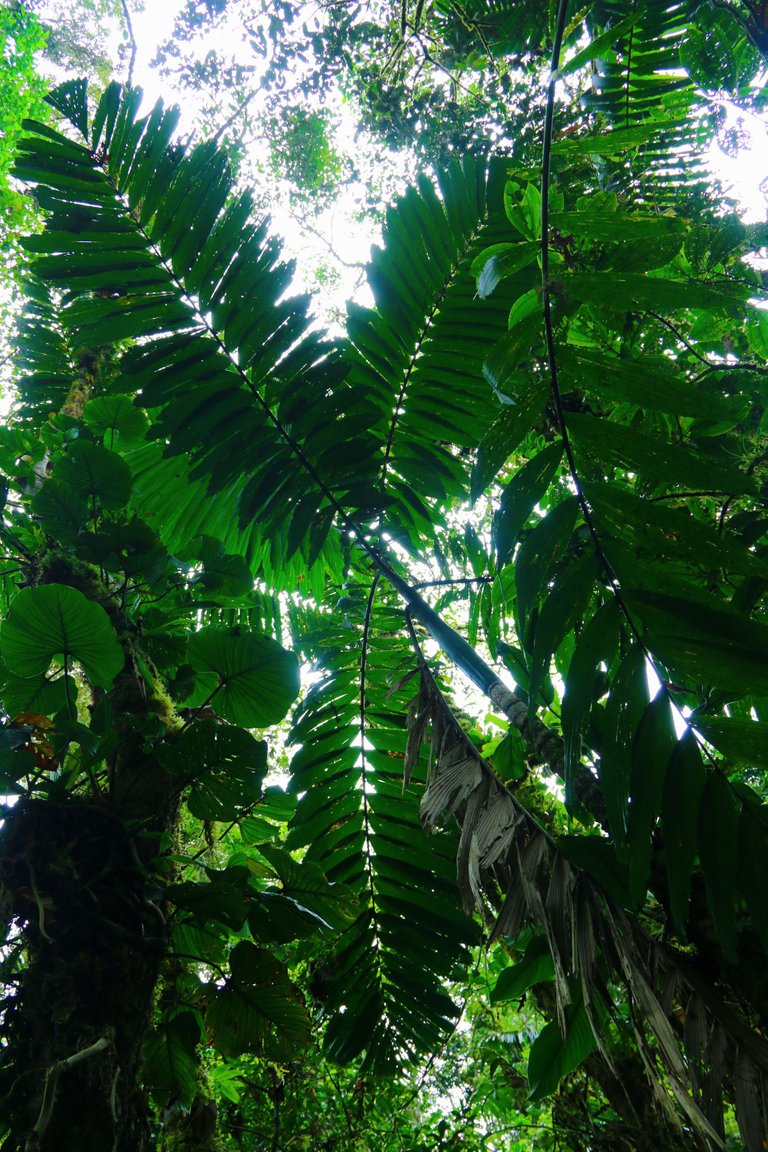
Broad leafed herbs are very common in this climatical region. By having such a large surface area and by aligning themselves towards the sun, the plants achieve maximum absorption of the valuable sunlight. What's more, as there's practically never a shortage of rainfall, we can say that the plants are also very well fed as they get a fair amount of H2O all year round. Like so, these green giants get created...
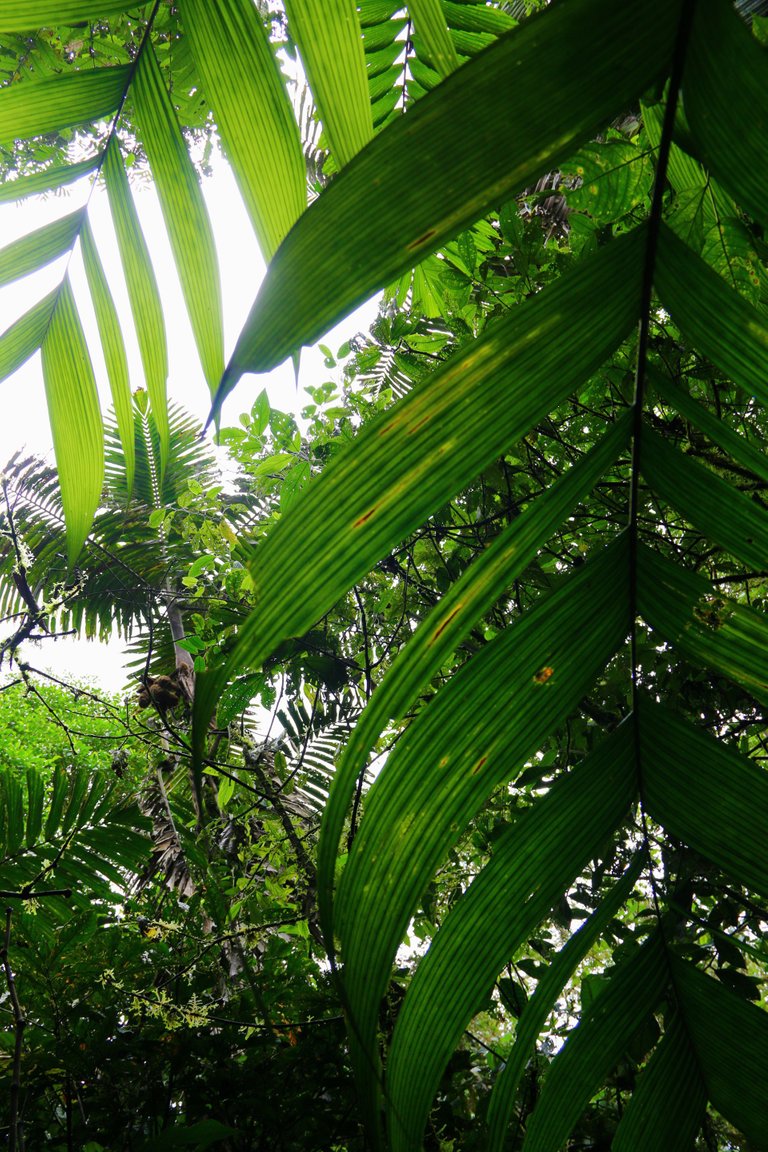
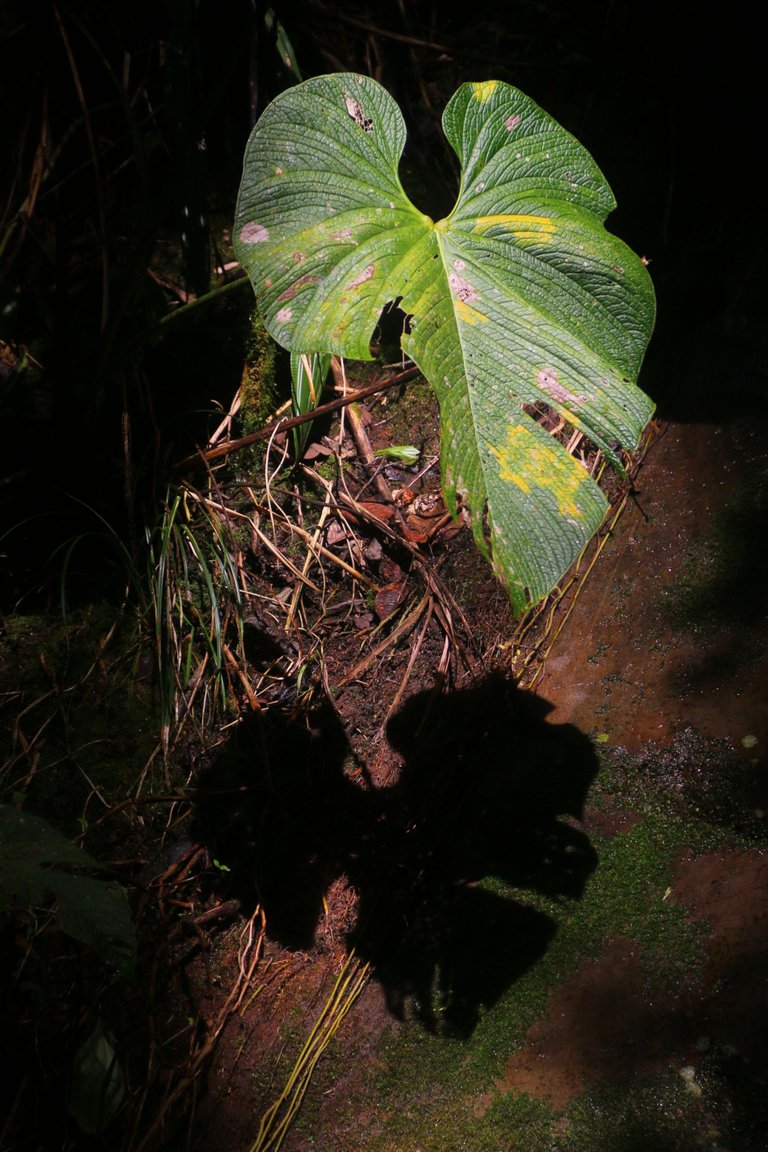
Lichens thrive in temperate rainforests. They grow on damp tree trunks as well as dead wood, creating a sense of spookiness(in my opinion!)
The forest path
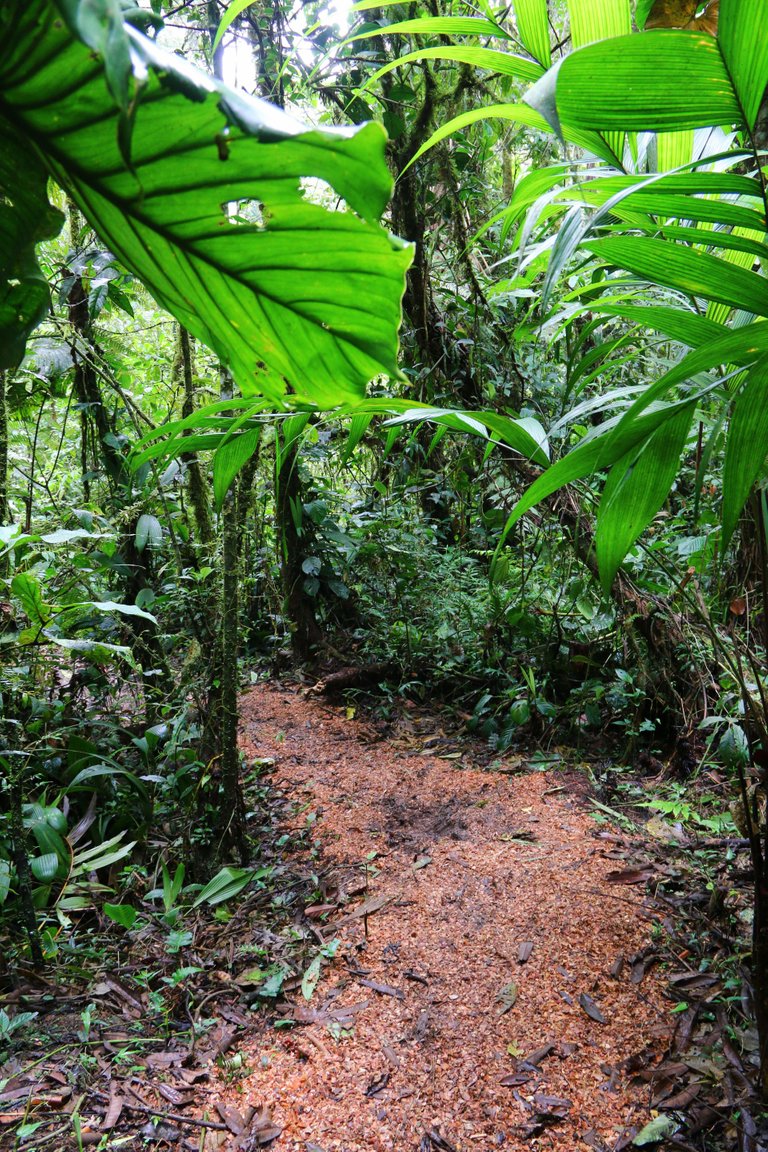
The path is very neat and allows the visitor to have a pleasant and comfortable walk through the forest. I imagine that it is a diligent work to be maintaining the trail clean from bushes and herbs, as they grow rather rapidly owing to the generous amounts of humidity. I could say, per contra, that the ground is a tiny bit slippery due to the aforementioned constant humidity! Either way, I walk slow and appreciate the diversity of plants that I'm surrounded with.
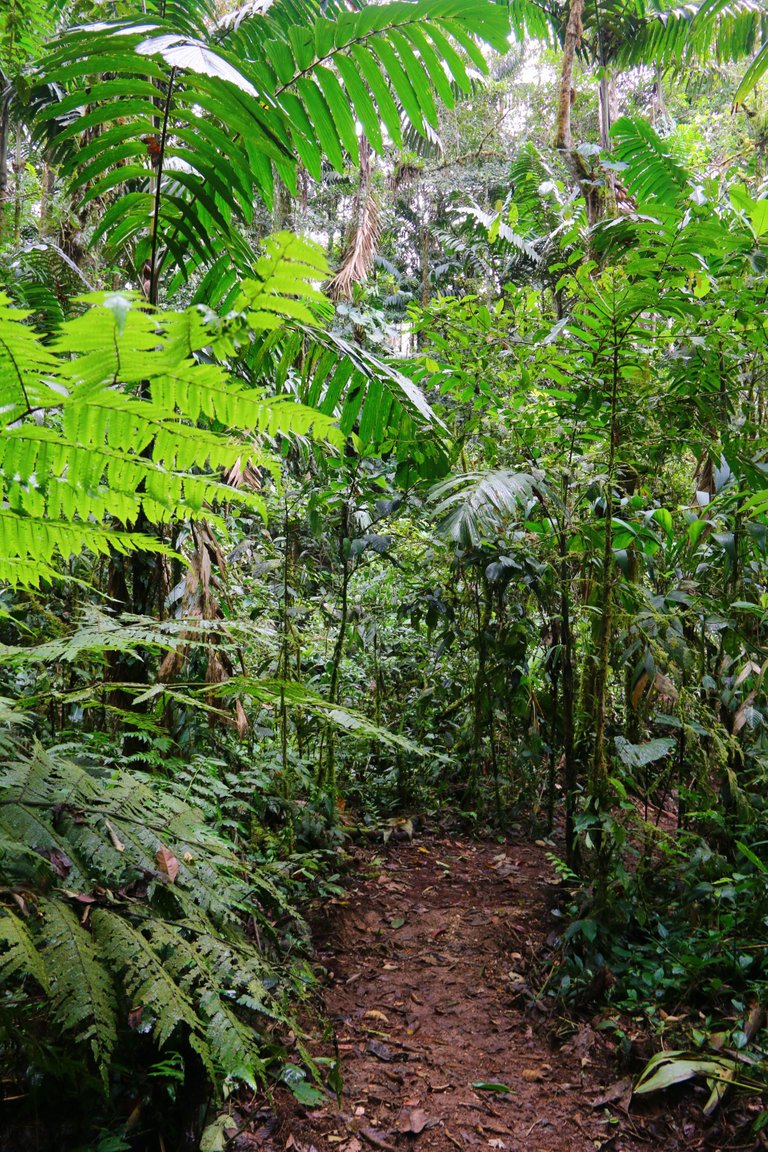
Information signs - Plant species
I highly appreciate it when there is interpretative trail signage along forest paths. As long as the signs stand beautifully among the foliage, I believe that they contribute to a more holistic experience; one can not only enjoy the forest life but also get some information on this very life they're witnessing!
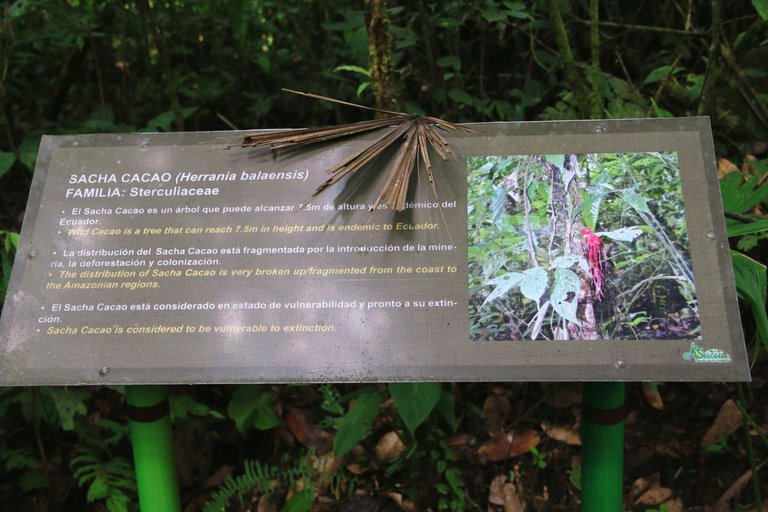
The distribution of Sacha Cacao is very broken up/fragmented from the coast to the Amazonian regions.
Sacha Cacao is considered to be vulnerable to extinction.
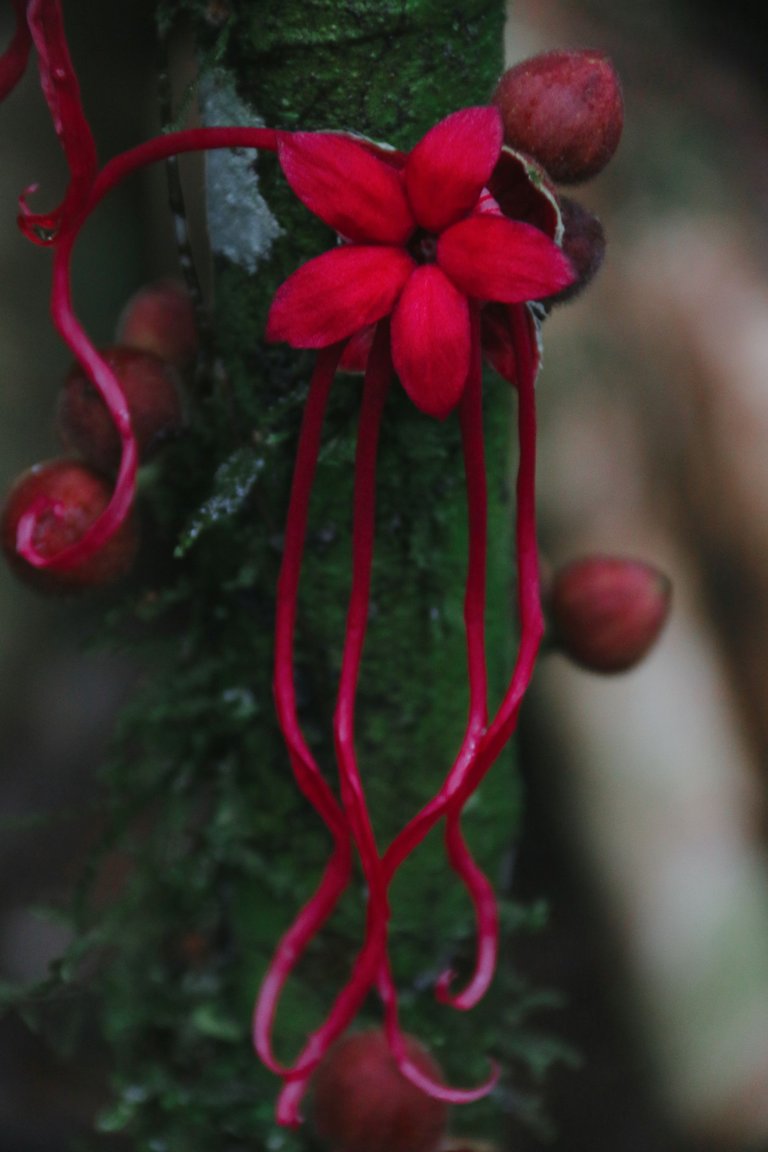
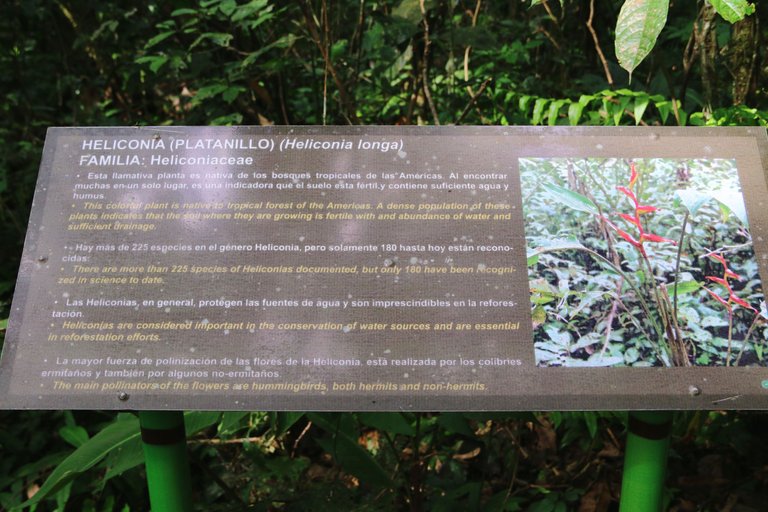
There more than 225 species of Heliconias documented, but only 180 have been recognized in science to date.
Heliconias are considered important in the conservation of water sources and are essential in reforestation efforts.
The main pollinators of the flowers are hummingbirds, both hermit and non-hermit.
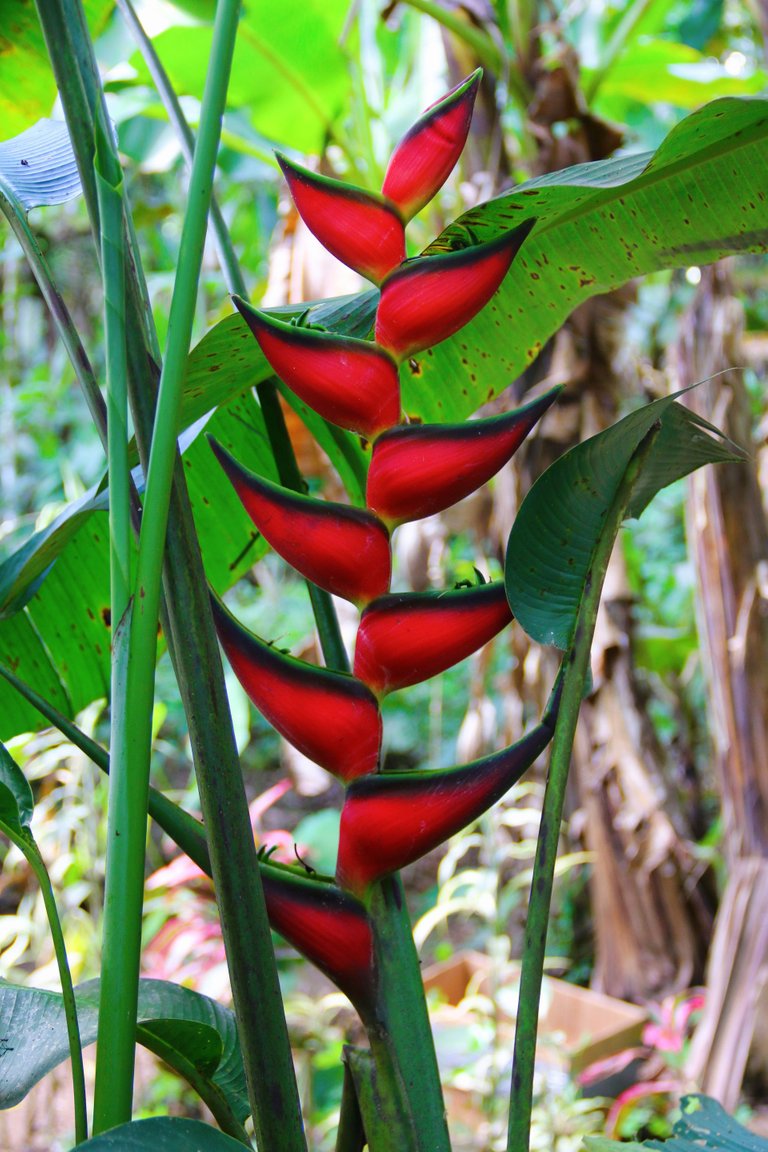
Heliconia is by far one of my favorite Amazonian plants! These colorful towering beauties are commonly called "parrot flowers" , "lobster claws" , "fake bananas" - they are actually related to the banana plant even though they don't produce an edible crop. Their name is derived from the Greek language; Mount Helicon (Ελικώνιος) was the adobe of the nine Muses, which were said to remain young and beautiful forever. (yes, I am a language nerd!)
The leaves are primarily used fresh but also can be dried and used to make a tea that is considered to be highly stimulating but relaxing at the same time.
The concentration of caffeine in Guayusa can range between 2.9% - 3.28% dried weight which is considerably high comparing to coffee that can range between 1.2% - 2.2%.
Guayusa contains all the amino acids essential to humans including Leucina which can be produced by the human body but is a key component to repairing and construction of muscle tissue.
Shockingly Guayusa contains 50% more antioxidants than green tea.
Both facts about caffeine, being considerably higher than in coffee, and antioxidants, being twice as much as in green tea, were extremely surprising to me. Needless to say, after reading this, I started drinking it on a daily basis!
Animals
Plants are fascinating organisms, aren't they? Especially in regions like the Amazonian rainforest, one can deeply appreciate the magnificence of the plant kingdom. Nevertheless, animals tend to be on the more popular side. And righteously so! Let's see some gems from the animal kingdom. :)
Starting with the marvellous arachnoids aka spiders.
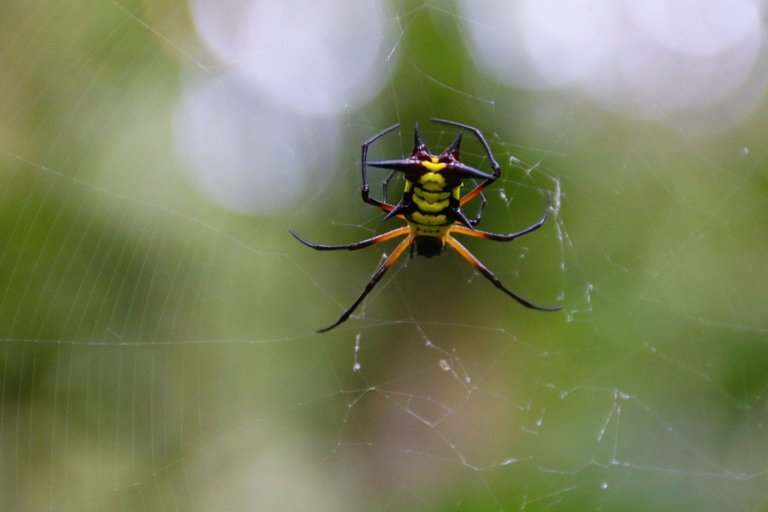
The Amazon basin is home to more than 3.600 different species of spiders, many of which are exclusively found there.
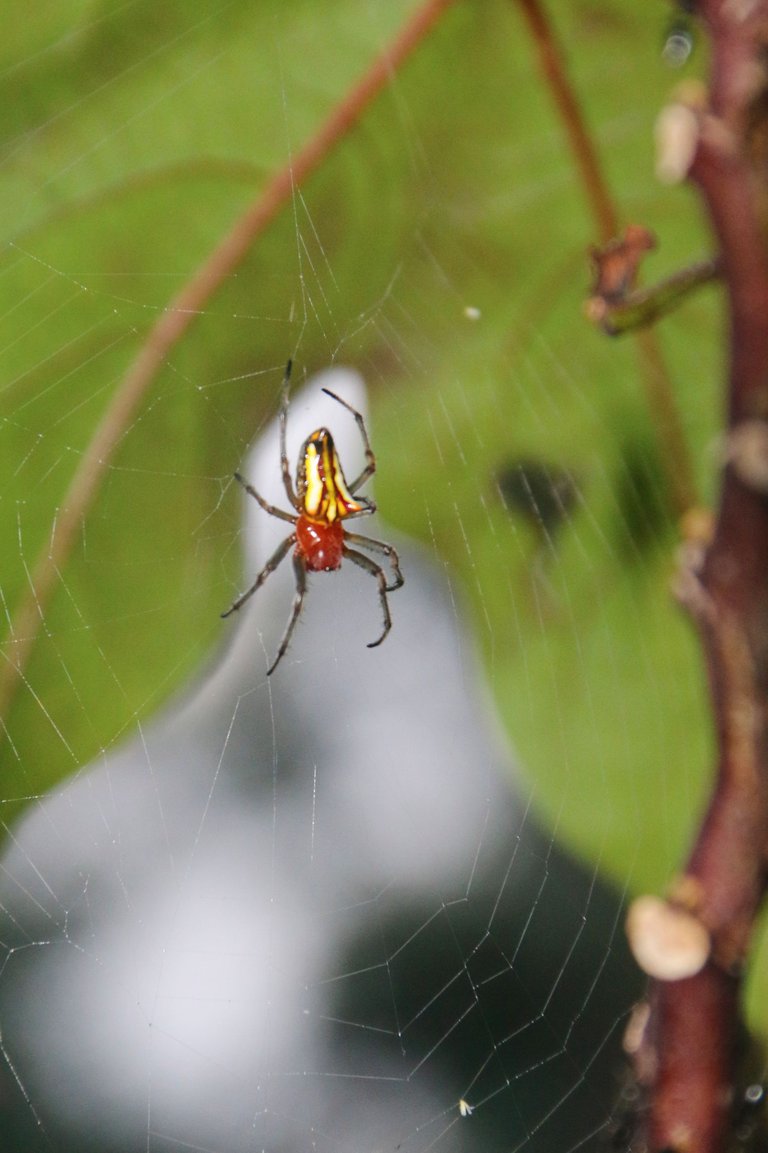
This path of the Botanical Garden was of course clean from spider webs , but if you were to walk on a non-maintained forest path, you would need to hold a stick ahead of you in order to rid of all the webs that are woven across the path. Taking into account that a considerable amount of spider species are venomous, caution is essential.
Now who doesn't love monkeys?! Sneaky as they might be, they're adorable cousins of ours!
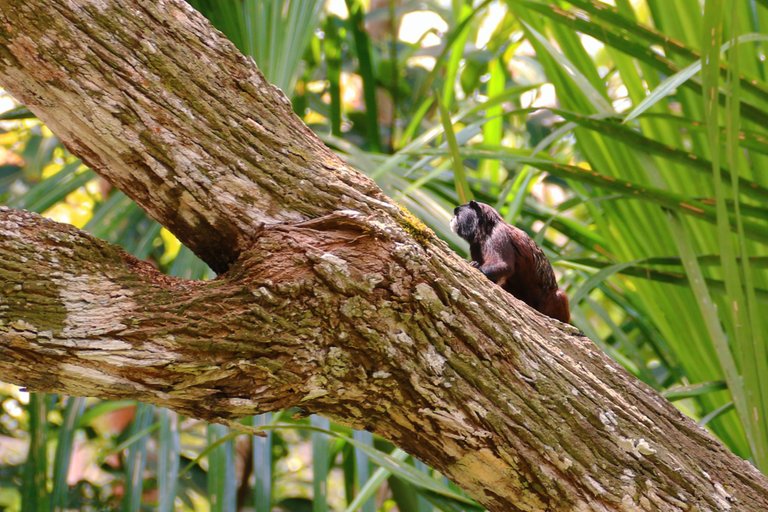
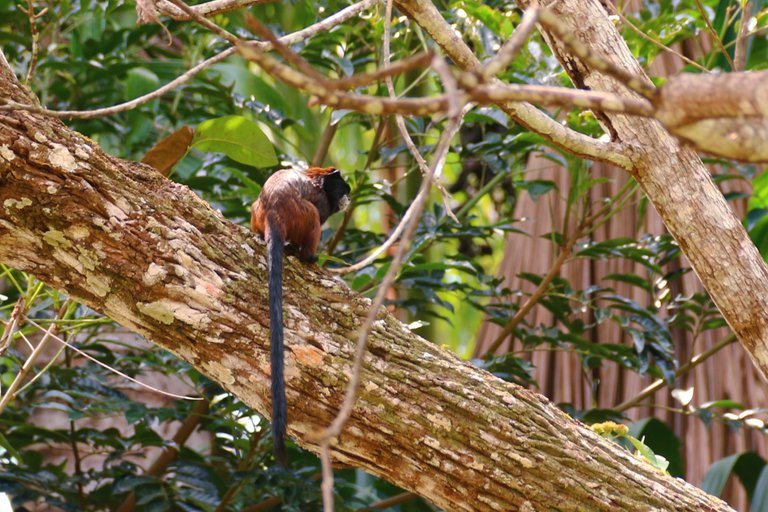
These two fellas were chasing each other on the trees.
Last and definitely not least, my favorite group of animals; I present you a sweet couple of birdies, called trogons.
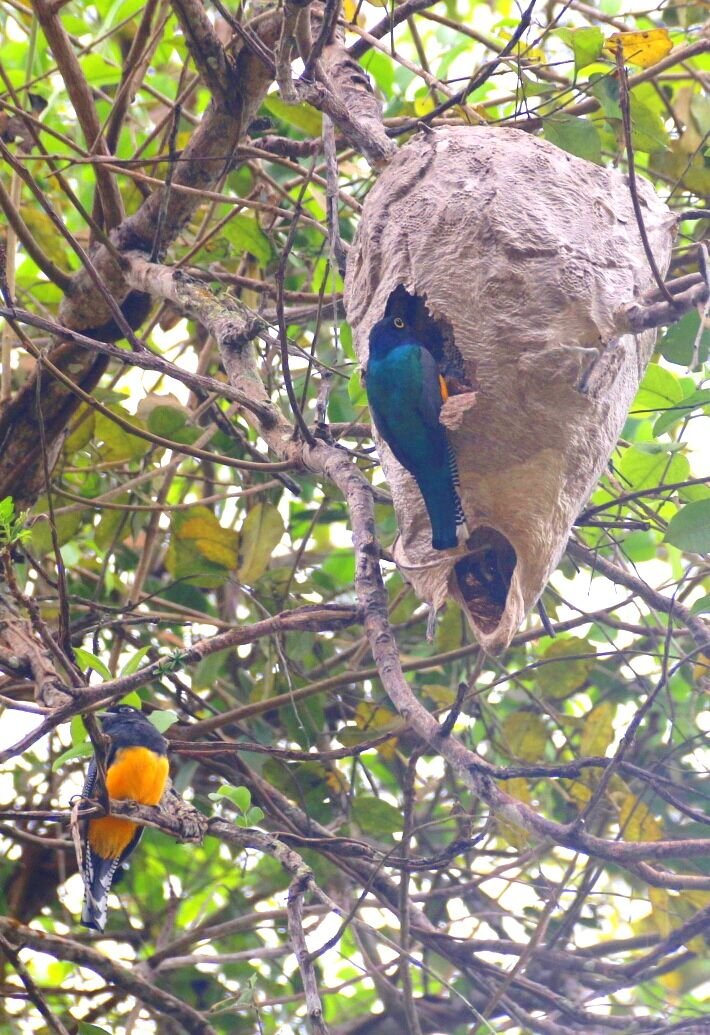
male(higher) and female(lower)
Trogons are a group of birds that are known to nest inside wasp nests, termite nests and arboreal nests of ants. These two lovers are using a wasp nest (called vespiary) as their home. Here's the story I was told by an Ecuadorian bird enthusiast: The Trogons invade the wasp nest early in the morning, while the wasps are not yet active. During the day they hunt the wasps, not only the ones laying on the vespiary but also the ones flying around it. When night comes, wasps become inactive and so the birds can sleep without disturbance from their unwanted flatmates. This daily battle is evergoing as there hasn't been a recorded case of the trogons eliminating all the wasps!!! Wonders of Nature!
Español

Parque Botánico Regional de Sucúa
El Parque Botánico del Cantón Sucúa es un parque regional que ocupa 27,82 hectáreas del territorio ecuatoriano. Su objetivo principal es preservar la flora local y brindar información sobre las numerosas especies de plantas que se encuentran en el área de conservación. El clima de la zona es subtropical húmedo, uno de los climas más favorables para la biodiversidad. Lo que quiere decir que este bosque prospera en la vida! tanto vegetativa como faunística. A través de este majestuoso bosque hay un sendero de 1200m de largo para que los visitantes puedan tener una experiencia de lo que el bosque subtropical tiene para ofrecer.
Adivina qué; Acepté la oferta! Así empiezo a caminar por este sendero hecho por el hombre que cruza un trozo de bosque prístino.

Arboles y verdor!
Hay un montón de cosas que me encantan de la selva tropical. Uno de ellos es ese tamaño de árboles. La magnitud es simplemente convincente para mí. Me ccausa asombro y me hace sentir pequeña, no de una manera despectiva sino más bien de una manera tranquilizadora; La naturaleza es una madre protectora e invencible.

Otra cosa que me fascina de los bosques tropicales es el VERDOR! Mis ojos se bañan en este exuberante paraíso verde.

Las hierbas de hojas anchas son muy comunes en esta región climática. Al tener una superficie tan grande y al alinearse hacia el sol, logran la maximización de la absorción de la valiosa luz solar. Además, como prácticamente nunca faltan las precipitaciones, podemos decir que las plantas están muy bien alimentadas ya que reciben una buena cantidad de H2O durante todo el año. Así nacen estos gigantes verdes...


El camino del bosque

El sendero es muy cuidado y permite al visitante tener un cómodo y agradable paseo por el bosque. Me imagino que es un trabajo diligente mantener el camino limpio de arbustos y hierbas, ya que crecen bastante rápido debido a las generosas cantidades de humedad. Podría decir, por el contrario, que el suelo está un poco resbaladizo debido a la humedad constante mencionada anteriormente! De cualquier manera, ando lento y aprecio la diversidad de plantas que me rodean.

Señalización - Especies de plantas
Aprecio mucho cuando hay señalización interpretativa de senderos a lo largo de caminos forestales. Mientras los letreros se vean bonitos y apropiados entre el follaje, creo que contribuyen a una experiencia más holística; uno no solo puede disfrutar de la vida del bosque sino también obtener información sobre esta misma vida que está presenciando!

La distribución del Sacha Cacao está muy fragmentada por la introducción de la minería, la deforestación y colonización.
El Sacha Cacao está considerado en estado de vulnerabilidad y pronto a su extinción.


Hay más de 225 especies en el genero Heliconia, pero sólamente 180 hasta hoy están reconocidas.
Las heliconias en general protegen las fuentes de agua y son imprescindibles se consideran importantes en la reforestación.
Los mayor fuerza de polinización de las flores de las Heliconias está realizada por los colibríes ermitaños y también algunos no ermitaños.

Heliconia es, con mucho, una de mis plantas amazónicas favoritas! Estas bellezas imponentes y coloridas se denominan comúnmente "flores de loro", "pinzas de langosta", "plátanos falsos"; en realidad, están relacionadas con la planta de platano, aunque no producen una fruta comestible. Su nombre se deriva del idioma griego; El monte Helicón (Ελικώνιος) era el adobe de las nueve Musas, de las que se decía que permanecían jóvenes y hermosas para siempre. (¡sí, soy un nerd de los idiomas!)
Las hojas de la planta Guayusa se secan y se elabora con ellas un té con propiedades estimulantes y relajantes para el organismo.
El contenido de la cafeína en Guayusa es de 2,9 % - 3,28 % en peso seco, en comparación con el café, tiene entre 1,2 % - 2,2 % de cafeína en peso.
Guayusa contiene todos los aminoácidos esenciales para los humanos, incluida la leucina, que puede ser producida por el cuerpo humano pero es un componente clave para la reparación y construcción del tejido muscular.
Sorprendentemente, la Guayusa contiene un 50 % más de antioxidantes que el té verde.
Ambos hechos sobre la cafeína, siendo considerablemente más alta que en el café, y los antioxidantes, siendo el doble que en el té verde, fueron súper sorprendentes para mí. No hace falta decir que después de leer esto, comencé a beberlo a diario!
Animales
Las plantas son organismos fascinantes, verdad? Especialmente en regiones como la selva amazónica, uno puede apreciar profundamente la magnificencia del reino vegetal. Sin embargo, los animales tienden a estar en el lado más popular. Y con razón! Veamos algunas gemas del reino animal. :)
Comenzando con los maravillosos aracnoides, también conocidos como arañas.

La cuenca del Amazonas alberga más de 3.600 especies diferentes de arañas, muchas de las cuales se encuentran exclusivamente allí.

Este camino del Jardín Botánico estaba, por supuesto, limpio de telarañas, pero si uno tuviera que caminar por un camino forestal sin mantenimiento, necesitaría sostener un palo delante para deshacerse de todas las telarañas que están tejidas de un lado del camino al otro. Teniendo en cuenta que una cantidad considerable de especies de arañas son venenosas, no suena tan chévere!
Quién no ama a los monos? Por astutos que sean, son unos adorables primos nuestros!


Estos dos muchachos se perseguían en los árboles.
Por último y definitivamente no menos importante, mi grupo favorito de animales; Les presento una dulce pareja de pajaritos, llamados trogones.

macho (arriba) y hembra (abajo)
Los trogones son un grupo de aves que anidan dentro de nidos de avispas, nidos de termitas y nidos arbóreos de hormigas. Estos dos amantes están usando un nido de avispasp como su hogar. Esta es la historia que me contó un Ecuatoriano aficionado a las aves: Los trogones invaden el nido de avispas temprano en la mañana, mientras que las avispas aún no están activas. Durante el día cazan las avispas, no sólo las que se posan sobre el nido sino también las que vuelan a su alrededor. Cuando llega la noche, las avispas se vuelven inactivas y las aves pueden dormir sin que sus indeseables compañeros de piso las molesten. Esta batalla diaria es eterna ya que no ha habido un caso registrado de que los trogones eliminen a todas las avispas! Maravillas de la naturaleza!
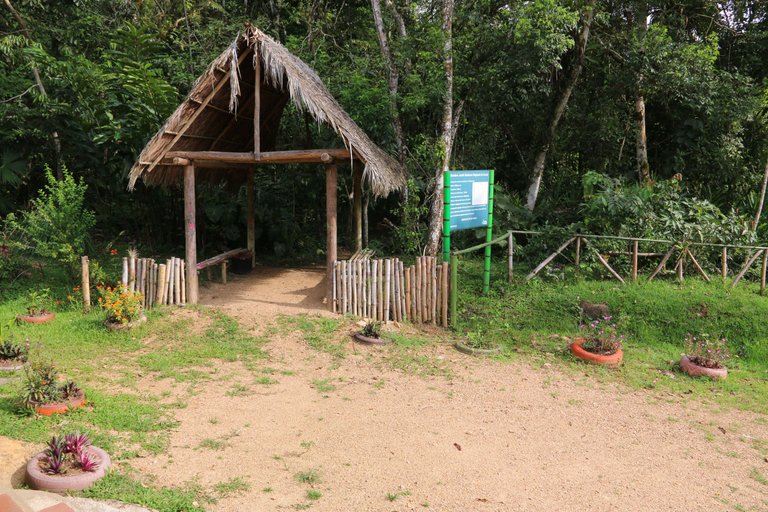
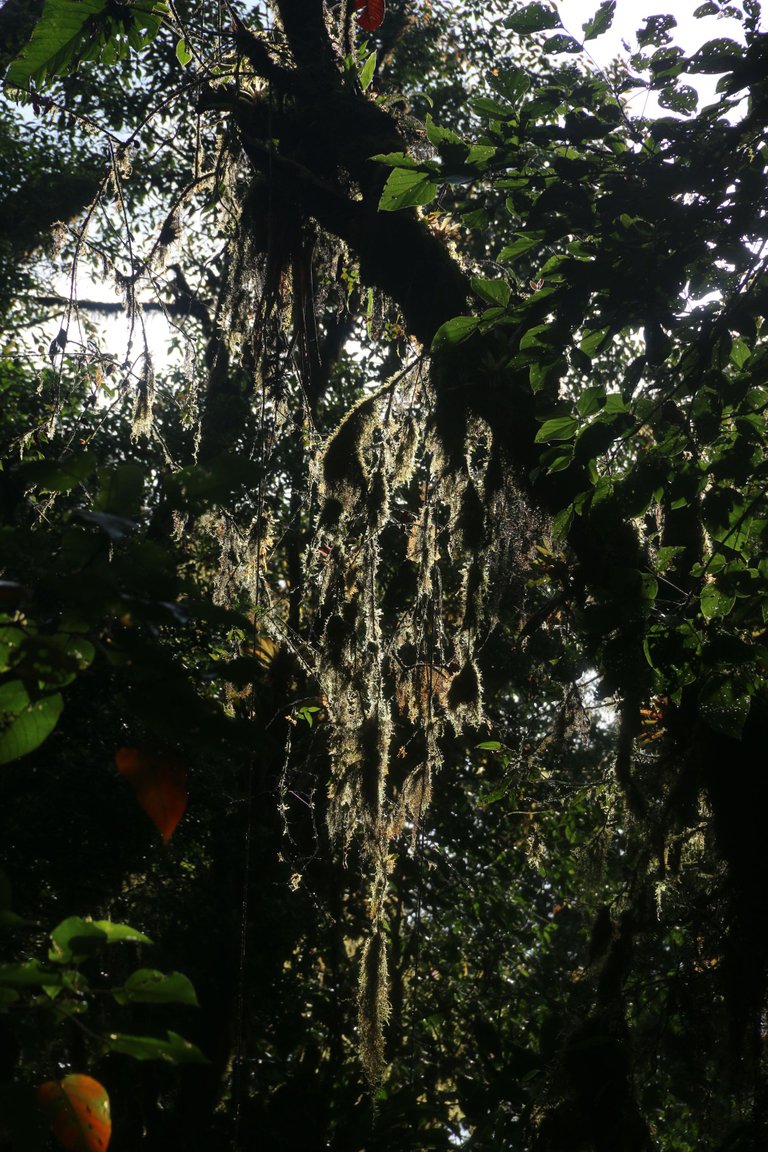
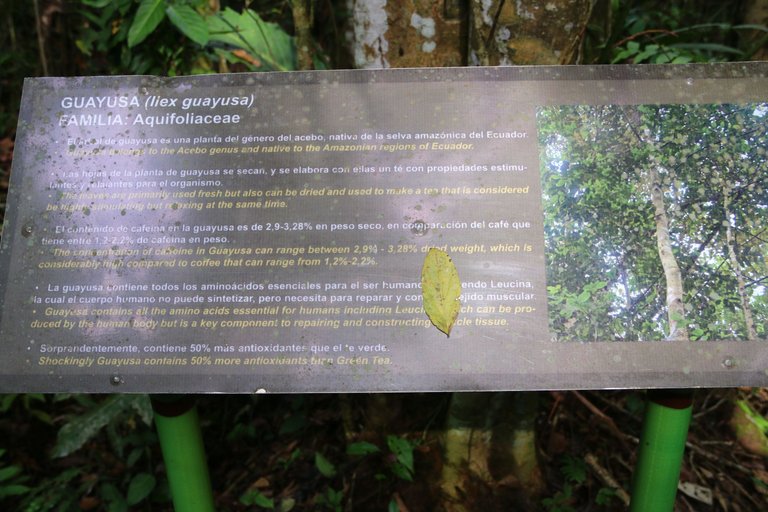
Congratulations @marilandia! You have completed the following achievement on the Hive blockchain and have been rewarded with new badge(s):
Your next payout target is 250 HP.
The unit is Hive Power equivalent because post and comment rewards can be split into HP and HBD
You can view your badges on your board and compare yourself to others in the Ranking
If you no longer want to receive notifications, reply to this comment with the word
STOPTo support your work, I also upvoted your post!
Support the HiveBuzz project. Vote for our proposal!
Congratulations, your post has been added to Pinmapple! 🎉🥳🍍
Did you know you have your own profile map?
And every post has their own map too!
Want to have your post on the map too?
Just wow @marilandia! The pictures are stunning and I enjoyed a lot this trip to the Botanic Garden of Sucúa Canton and not only because you shared a bunch of useful information about the plants and animals there but I really liked the way you chose to present this place through your photos. Thank you for taking us with you once again and I am very keen to see your future trips/articles :) Keep up the great job!
!PIZZA
!LOLZ
!LUV
@marilandia, @lofone(1/1) sent you LUV. wallet | market | tools | discord | community | <>< daily
wallet | market | tools | discord | community | <>< daily
HiveWiki - learn from it, help improve it.
lolztoken.com
They can really get inside your head.
Credit: reddit
@marilandia, I sent you an $LOLZ on behalf of @lofone
Delegate Hive Tokens to Farm $LOLZ and earn 110% Rewards. Learn more.
(1/6)
Thank you @lofone , I'm truly glad you enjoyed it that much. Thanks a lot for your support :)
I gifted $PIZZA slices here:
@lofone(1/5) tipped @marilandia (x1)
Learn more at https://hive.pizza!
https://twitter.com/2889181577/status/1592491977136046080
The rewards earned on this comment will go directly to the people( @lofone ) sharing the post on Twitter as long as they are registered with @poshtoken. Sign up at https://hiveposh.com.
Hiya, @LivingUKTaiwan here, just swinging by to let you know that this post made it into our Honorable Mentions in Daily Travel Digest #1700.
Your post has been manually curated by the @pinmapple team. If you like what we're doing, please drop by to check out all the rest of today's great posts and consider supporting other authors like yourself and us so we can keep the project going!
Become part of our travel community:
Many many thanks @livinguktaiwan and @pinmapple for your great support once again , and also for your amazing work. Keep up creating a lovely space for all travelers to meet and share their explorations and adventures :)